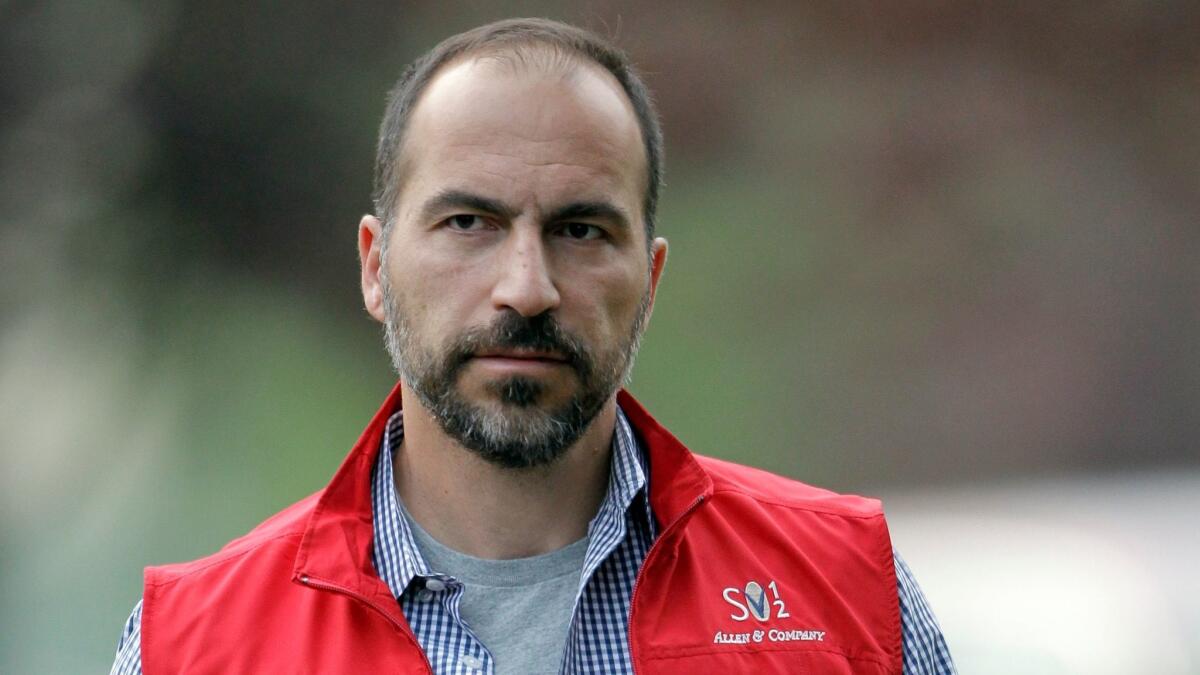Uber picks up new CEO from Expedia

Uber has chosen Dara Khosrowshahi, the chief executive of travel booking website Expedia, to be its new chief executive, according to a source unauthorized to comment publicly.
Khosrowshahi’s reported appointment ends Uber’s hunt to replace the company’s controversial co-founder and former chief executive, Travis Kalanick, who was pressured to resign in June.
Representatives for Uber, its board of directors and Expedia did not immediately respond to a request for comment.
The search was a bumpy ride for the ride-hailing firm, with rumors of Kalanick angling for a return to the leadership role and a lawsuit from Uber investor Benchmark aiming to bar him from interfering with the hiring of a new CEO.
Uber’s board of directors interviewed dozens of potential candidates and narrowed the search to three people, according to a person with knowledge of the matter.
It might sound like one of the tech industry’s most coveted positions: leading the world’s most valuable start-up toward its much-ancitipated initial public offering, expanding its forays into self-driving technology, and continuing to upend the transportation industry across the globe.
But candidates were reportedly reluctant to inherit the company’s mounting list of problems, such as allegations about a culture of sexism, a high-profile lawsuit from Google’s self-driving vehicle arm, Waymo, and mounting driver dissatisfaction.
Promising candidates such as Hewlett Packard Enterprise CEO Meg Whitman and departing GE chief Jeff Immelt were widely known to be among the final three candidates, but both took to Twitter to announce they didn’t want the job.
Khosrowshahi was the mysterious third candidate, who managed to dodge the leaks that have plagued the company and its board since Kalanick’s resignation.
“He is exactly the kind of leader Uber needs right now,” said Henry Harteveldt, a travel industry analyst at Atmosphere Research who has followed Khosrowshahi’s exploits.
“He’s adult enough to face the cultural issues at Uber, and he’s not stodgy or from a legacy technology company.”
Analysts and entrepreneurs who have worked with Khosrowshahi described him as a “fair” leader who “does more listening than talking.”
In the lead-up to his appointment, Uber’s investors were embroiled in disagreements as to what kind of CEO Uber needed.
Investors and corporate governance experts had framed the CEO search as something of a quagmire because the board was looking for one person to perform two very different tasks.
As a company that has more than 12,000 employees, a $70-billion valuation, and a looming expectation to go public sooner rather than later, Uber needs a leader with vast management experience who can help the company correct its course and prepare for an IPO, business experts said.
But if Uber wants to remain a disruptive force in the transportation industry a decade from now, some investors believe it needs a visionary CEO who isn’t afraid of taking risks.
It’s rare to find both those qualities in one person, investors said. Even some of the most successful technology companies don’t have CEOs who can do it all.
Mark Zuckerberg may be considered a product visionary, but Facebook’s chief operating officer, Sheryl Sandberg, is widely credited for helping grow the company’s moneymaking business. Larry Page and Sergey Brin were the co-founders of Google, but it was outsider Eric Schmidt who was brought on as CEO to grow the company’s operations.
Until Kalanick resigned, some investors and management experts believed that appointing an experienced chief operating officer to work alongside the brash-but-forward-thinking CEO would offer the balance Uber’s executive leadership needed. But in lieu of that, business experts believe an experienced manager is the best bet.
“A lot of start-ups get going on the energy of the founders, but now they have to really professionalize,” said Lynn Isabella, an associate professor at the University of Virginia’s Darden School of Business. “They have to think about the systems and processes and the values they want to systemically infuse across thousands of people. So it’s not surprising that the search committee would turn to individuals with a track record of managing large organizations.”
Khosrowshahi appears to fall somewhere in the middle, having been the CEO of the publicly-traded Expedia since 2005, but also having a reputation as an innovator who turned the company from a travel agency into a global brand that now has its foot in the so-called sharing economy, of which Uber is a part.
Prior to joining the online travel booking site, the Iranian American entrepreneur served as chief financial officer of Barry Diller’s IAC. Matt Cohler, a partner at Benchmark who recently took a seat on Uber’s board, worked closely with IAC to steward the development of the dating app Tinder in recent years. That relationship may have helped in identifying Khosrowshahi as a candidate. IAC founder and Chairman Barry Diller is Expedia’s chairman.
Before IAC, Khosrowshahi — who has a degree from Brown University in electrical engineering — served as a vice president of investment banking firm Allen & Co. His financial background could prove useful for Uber, which is currently without a chief financial officer.
Khosrowshahi shares some similarities with his predecessor, including a fascination with self-driving cars (he tweeted in 2014 his enthusiasm for Google’s autonomous vehicle) and an interest in on-demand transportation (he personally invested in on-demand trucking company Convoy in July).
His experience at Expedia also mirrors some of the challenges Uber has come up against. In the U.S. and abroad, Uber faces fierce competition from the likes of Lyft, Grab and Ola. Expedia has so far fended off Priceline, Airbnb and Google, which have increasingly encroached on its travel and lodging booking business.
Like Kalanick, Khosrowshahi has in his capacity as CEO opted for an offensive strategy. Two years ago Expedia paid $3.9 billion for HomeAway, a U.S. vacation rental company that competes with Airbnb. Expedia also owns travel brands Orbitz, Travelocity and Egencia.
But there are also significant differences, both between Khosrowshahi and Kalanick, and Uber and Expedia’s businesses.
Although both Uber and Expedia fall under the travel and transportation banner, Uber relies on hundreds of thousands of independent contractors to perform its core function: offering rides to passengers. Expedia, meanwhile, predominantly plays the role of a middleman in connecting customers with hotels and airlines.
Expedia is also a publicly-traded company that is already profitable, whereas Uber is privately held, with a lofty valuation and staggering financial losses.
In matters of politics, Kalanick faced scrutiny when he joined President Trump’s now-dissolved economic advisory council in December, and has largely kept his views on the current administration close to his chest. Khosrowshahi has openly criticized the Trump administration, supporting a lawsuit Washington state filed this year against the president over his travel ban.
He is not the female CEO Uber had hoped to hire to remedy its image as a workplace hostile toward women, but as a vocal advocate for immigrants his hiring is likely to hit the right note with many in the predominantly liberal-leaning technology community. (Khosrowshahi has donated to both Democratic and Republican candidates; during the 2016 presidential election he made donations to Hillary Clinton’s campaign.)
His hiring by Uber was first reported by the New York Times.
As CEO, Khosrowshahi will be tasked with helping Uber pick up the pieces after a tumultuous year defined by scandal, departures and lawsuits.
But he’s no stranger to starting at companies during trying times. In a July interview with the Financial Times, Khosrowshahi recounted that after joining Expedia in 2005, the company was hit hard by the financial crisis. Rather than capitulating, Expedia doubled down on its technology, investing heavily to compete with other travel search engines. It’s a move that has since paid off.
“Desperation sometimes drives innovation,” he told the publication.
Times staff writer Paresh Dave contributed to this report.
Twitter: @traceylien
UPDATES:
9:10 p.m.: This article was updated to include additional reporting about Dara Khosrowshahi and Uber.
This article was originally published at 6:05 p.m.







